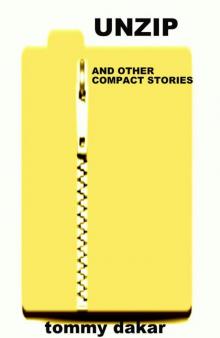Unzip and Other Compact Stories 

by Tommy Dakar
Genre: Contemporary
Published: 2014
View: 3795
Read OnlineRead Unzip and Other Compact Stories Storyline:
A new collection of short stories by Tommy Dakar. From humour to intrigue, from irony to philosophy, each piece has been carefully constructed to perform its task.An observant boy goes to the park, returns home, and has a conversation with his mother in a fabricated, unlikely, never-happened, plausible, impossible, invented, realistic coming-of-age story. What Never Happened: An Observation, a short story, was first published in Waccamaw, Issue 7.From What Never Happened, An Observation:I was a boy. (Dear reader, for the last time I say to you, please remember that this is only a story, meant to comfort friends, relations, and acquaintances, and as such it only exists in your head and those heads who have heard it.) As a boy, I was not especially different than other boys, though I was somewhat indifferent towards them. Of girls, I remember the existence of none save my mother and other assorted relatives: a passel of cousins, an aunt, and a grandmother. I was predominantly interested in myself, though not in a selfish way. I was simply not aroused by games of sport or make-believe or conversation. Allow me to make myself clear: sport, make-believe, and conversation were three of my most cherished pastimes, but they were activities I preferred to conduct with myself. With others these pastimes were diluted, somehow losing their piquancy.What I was most passionate about, though, was observing. I would sit for hours in the same spot, quietly taking mental note of my surroundings. I would not speak my observations, nor would I write them down. I would simply take mental note of the position of a fork on a table, of the number of tines it had, of the sharpness of those tines, of the curvature of the head, of how gracefully the head met the handle at the neck, of any ornamentation on the handle, of any fingerprints. I would note the construction of the table, how its disparate parts were joined, the lay of the grain of the wood, the pattern of the sunlight splashed on the tabletop, the angle of sunlight entering through the window, the shape of a leaf outside the window. When I could fit words to my observations, I did (silently), but I never forced the issue. I did not wish to force my surrounding reality to conform to words if no words were adequate. For example, if the pattern of light on the table was rhombic, I would say so silently to myself, and so too if I could say with reasonable probability that the light passing through the window (forgiving refraction) entered the kitchen at an angle of 30, 45, or 60 degrees while my mother spread peanut butter and jelly on bread for me, I would use just those words. But more often than not, the pattern of light was decidedly unrhombic and indeed indescribable, just as the angle of the sunlight’s penetration was generally immeasurable and inestimable. In such instances, I would wordlessly observe and make wordless mental note. The words, after all, were not what I was after. Words were merely tools. I was after the thing itself.Pages of Unzip and Other Compact Stories :